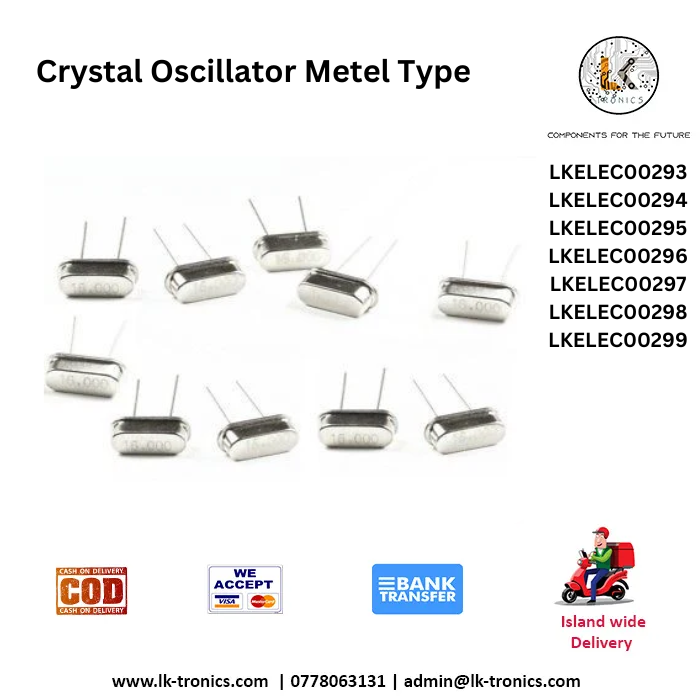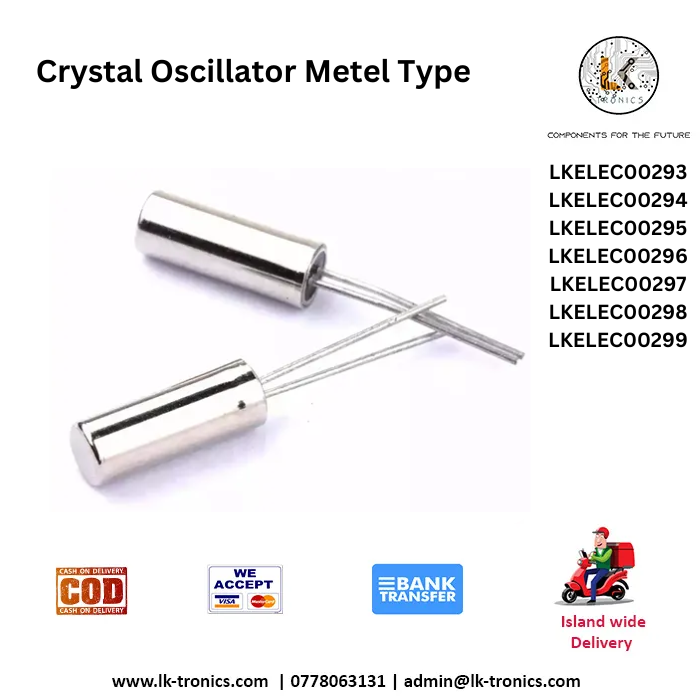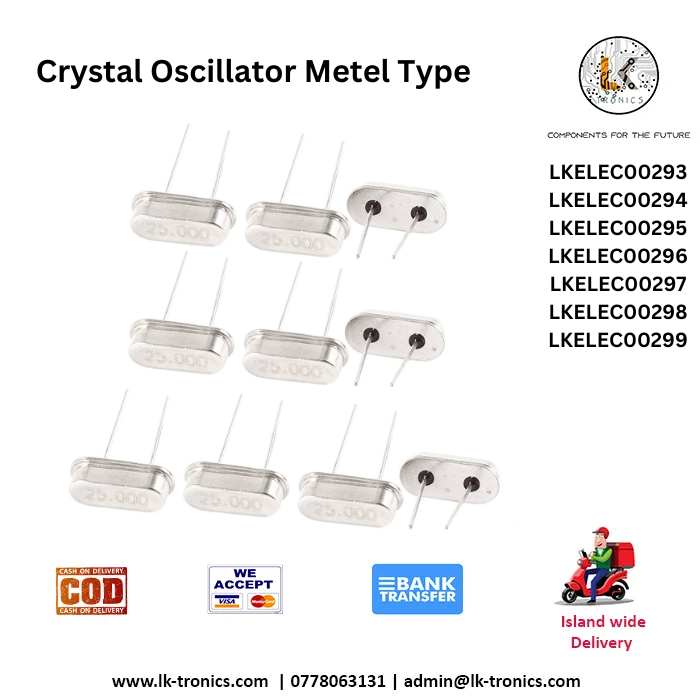Crystal Oscillator, Electronics accessories
Crystal Oscillator Metal Type
Availability:
In stock
LKELEC00293 | LKELEC00294 | LKELEC00295 | LKELEC00087 | LKELEC00296 | LKELEC00088 | LKELEC00089 | LKELEC00090 | LKELEC00297 | LKELEC00298 | LKELEC00299
Rs 25.00 Rs 100.00
Crystal Oscillator Metal Type 32 KHz | 32.76 KHz | 6 MHz | 8 MHz | 11.05 MHz | 12 MHz | 16 MHz | 20 MHz | 22.11 MHz | 24 MHz | 24.57 MHz
The Crystal Oscillator Metal Type is available in various frequencies, including 32 KHz, 6 MHz, 12 MHz, and up to 24.57 MHz. Designed for precision timing in electronic circuits, this metal-type oscillator is ideal for clocks, microcontrollers, and RF applications
Crystal Oscillator General Specifications
- Frequency Range
- 32 KHz: Often used in timekeeping applications
- 32.76 KHz: Close to 32 KHz, typically used in low-power circuits.
- 6 MHz: Commonly used in microcontroller clocks or basic timing applications.
- 11.05 MHz: Higher frequency range, suitable for RF applications, communications, and precision timing circuits.
- 24 MHz: Ideal for high-speed applications, commonly seen in USB systems, microcontrollers, and clock circuits.
- 24.57 MHz: Close to 24 MHz, useful for similar high-speed applications.
- Package Type
- Metal Can Type (HC-49/U, HC-49/S): These are widely used for their reliability and robust packaging. The most common types are:
- HC-49/U: A through-hole package.
- HC-49/S: A smaller surface-mount version.
- Other Metal Packages: Smaller SMD metal packages like UM-1 or UM-5 can also be used,
- Metal Can Type (HC-49/U, HC-49/S): These are widely used for their reliability and robust packaging. The most common types are:
- Operating Temperature
- The standard temperature range is usually from -20°C to +70°C.
- Industrial temperature range: -40°C to +85°C.
- Frequency Tolerance
- Frequency tolerance can range between ±20 ppm (parts per million) to ±100 ppm.
- The tolerance depends on the application, with precision oscillators requiring lower ppm.
- Frequency Stability
- Similar to tolerance, frequency stability over temperature changes can range from ±20 ppm to ±100 ppm.
Other
- Load Capacitance
- Crystal oscillators typically have load capacitances of 6 pF to 32 pF, depending on the circuit design.
- This should match the requirements of your oscillator circuit for optimal performance.
- Drive Level
- The typical drive level for a crystal oscillator is between 1 µW to 500 µW, which should be specified according to the application to avoid overdriving the crystal.
- Aging
- Crystals typically have an aging specification of ±3 ppm/year or better. This describes the change in frequency over time.
- Equivalent Series Resistance (ESR)
- The ESR can range from 20 ohms to 100 ohms, depending on the frequency.
- Higher frequencies tend to have lower ESR values.
- Shunt Capacitance (C0)
- Typical values for shunt capacitance range between 3 pF to 7 pF.
Application Examples for Specific Frequencies
- 32 KHz – 32.76 KHz: Real-time clock (RTC) circuits, watches, and low-power timing applications.
- 6 MHz: Microcontroller timing, general clock circuits, communication systems.
- 11.05 MHz: Precision timing, RF circuits, communication equipment.
- 24 MHz – 24.57 MHz: High-speed data transfer circuits, USB systems, microcontroller clock sources.
VISIT OUR FACEBOOK PAGE FOR MORE INFO | MORE PRODUCT IN OUR SHOP
| Value | 32KHz, 32.76KHz, 6MHz, 8MHz, 11.05MHz, 12MHz, 16MHz, 20MHz, 22.11MHz, 24MHz, 24.57MHz |
|---|
Based on 0 reviews
Be the first to review “Crystal Oscillator Metal Type”
You must be logged in to post a review.












There are no reviews yet.